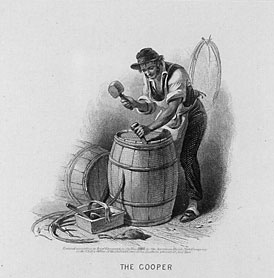On-Duty, cont.
On the bustling deck, craftsmen worked at their trades. These idlers did not stand watch. The blacksmith sharpened and straightened tools. A carpenter repaired damage to whaleboats and the mother ship, including caulking loose boards. The cooper banged hoops over staves, assembling casks that then were rolled into place.
The captain, himself, might mend canvas sails or study nautical charts in his cabin. He kept a strict order about the vessel, allotting rewards and punishments. Whaling captains commonly remarked, “This side of land (meaning Cape Horn) I have my owners and God Almighty. On the other side of land, I am God Almighty.” When someone onboard fell ill, the captain served as pharmacist, doctor and dentist.
The captain and his officers also kept detailed logbooks. These accounts were mandated by United States maritime law, but also served whalers well. They enabled whalers to track seasonal changes in the migration of whales at particular latitude and longitude. Logbooks indicated land sightings that might be a source of fresh water or dangerous coasts to avoid during storms. Typical entries consisted of the ship's position, the weather and wind direction, number of whales caught (including a harvested oil amount), other ships sighted, visible land or reefs, and injury or illness aboard ship. By law, instances of drunkenness and punishments carried out also had to be recorded.

Library of Congress